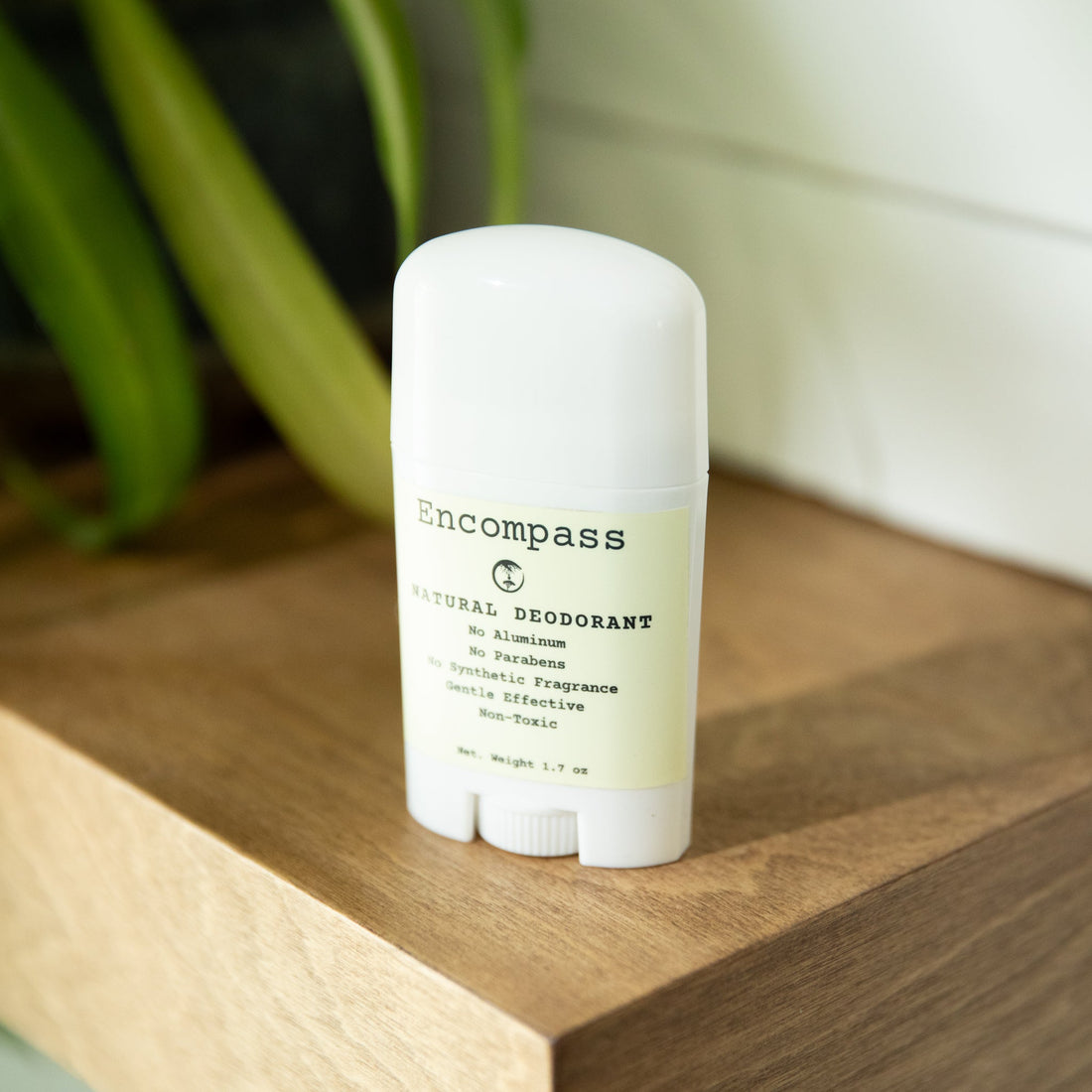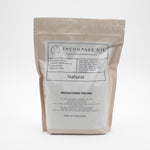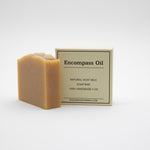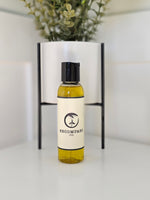
How Long Does Deodorant Last? A Complete Guide to Freshness, Safety, and Shelf Life
Share
Most of us apply deodorant every day without thinking much about how long it lasts—either on our skin or sitting unopened in the cabinet. But with growing interest in natural body care and cleaner labels, many people are starting to ask more specific questions: Does deodorant expire? How many hours of protection can I expect? And is there a difference between natural deodorants and conventional brands?
This guide breaks it down in detail. You’ll learn how deodorant works, what affects its longevity, and how to tell when it’s time to replace yours. We’ll also look at sustainability and ingredient safety, along with the natural approach offered by Encompass Deodorant.
Understanding Deodorant vs. Antiperspirant
Before we talk about shelf life and performance, it’s important to clarify the difference:
-
Deodorant targets odor. It works by neutralizing or masking the smell caused when sweat interacts with bacteria on the skin.
-
Antiperspirant reduces the amount of sweat itself. Aluminum salts temporarily block sweat glands, keeping the underarms drier.
Since deodorants don’t interfere with the body’s natural cooling process, they tend to be lighter on the skin and more appealing to those looking for a gentler option. Natural options, like Encompass Deodorant, skip aluminum altogether and instead use ingredients like arrowroot powder and magnesium hydroxide to manage odor without altering how your body sweats.
How Long Does Deodorant Last on Skin?
Most deodorants provide protection for about 6–12 hours, depending on your activity level, environment, and skin chemistry. Antiperspirants may last up to 24–48 hours because of their sweat-blocking properties.
Factors that influence how long deodorant lasts include:
-
Activity level – Exercise, heat, or stress-induced sweating can shorten effectiveness.
-
Formula type – Solid sticks, roll-ons, creams, and sprays all perform differently.
-
Ingredients – Aluminum-based antiperspirants last longer, but natural alternatives often need reapplication once or twice a day.
-
Skin type – Oilier skin or heavy sweating may reduce longevity.
Shelf Life of Deodorant: Does It Expire?
Yes—deodorant does expire, though not in the same way food does. Most products carry an expiration date between 12–36 months after manufacture. After that, ingredients may separate, lose effectiveness, or develop changes in scent and texture.
-
Conventional deodorants use preservatives that extend shelf life, but synthetic additives can sometimes irritate sensitive skin.
-
Natural deodorants tend to have a shorter shelf life (about 12–18 months) because they skip synthetic stabilizers. Small-batch production, like that at Encompass Farming, ensures freshness by keeping turnover high and formulations simple.
Signs your deodorant has expired:
-
Change in texture (dry, crumbly, or unusually soft)
-
Altered scent or faint sour smell
-
Skin irritation after application
-
Reduced odor protection
How Often Should You Reapply Deodorant?
Most people find a once-daily application is enough. However, you may want to reapply if:
-
You’re exercising or sweating heavily
-
You’re spending long hours outdoors in heat or humidity
-
You want to refresh before a night out or an important event
Natural formulas can be more forgiving here, since reapplying doesn’t overload your skin with synthetic chemicals. Encompass Deodorant, for example, glides on smoothly even mid-day without leaving buildup.
Factors That Affect Deodorant Longevity
Several personal and environmental factors determine how long deodorant lasts:
-
Climate – Hot and humid environments increase sweat and bacterial activity.
-
Diet – Spicy foods, caffeine, and alcohol can make body odor stronger.
-
Stress levels – Stress-induced sweat tends to be more pungent than heat-induced sweat.
-
Hygiene habits – Clean skin provides a better base for deodorant to work effectively.
This is why no deodorant—conventional or natural—performs the same for everyone. The goal is to find a formula that works with your body chemistry, not against it.
Tips to Maximize Deodorant Effectiveness
If you want your deodorant to last longer, both on the skin and in storage, here are some tried-and-true strategies:
-
Apply to clean, dry skin – Damp skin dilutes deodorant and reduces effectiveness.
-
Store in a cool, dry place – Heat can cause natural oils and butters to soften or melt.
-
Shave at night – Freshly shaved skin can be more sensitive; applying deodorant in the morning allows irritation to settle overnight.
-
Don’t over-apply – A thin, even layer works better than heavy swipes.
-
Close the cap tightly – This keeps air and moisture out, extending shelf life.
With natural deodorants like Encompass, storing them away from direct sunlight helps keep the essential oils and plant-based butters stable for longer.
Is Natural Deodorant as Effective as Conventional?
This is one of the most debated questions. The short answer is yes, but with a few caveats.
-
Adjustment period: Some people experience a “detox” phase when switching from aluminum-based antiperspirants to natural deodorants, where odor may seem stronger for a week or two.
-
Reapplication may be needed: Natural deodorants may require a mid-day refresh depending on activity.
-
Skin benefits: Without harsh chemicals, natural deodorants are gentler and often nourishing for sensitive skin.
Encompass Deodorant addresses common complaints about natural options by combining multiple odor-fighting ingredients—arrowroot powder, magnesium hydroxide, kaolin clay, and baking soda—while balancing them with soothing oils to prevent irritation.
Can Expired Deodorant Be Harmful?
Generally, using expired deodorant isn’t dangerous, but it’s not ideal either. The worst outcomes include:
-
Reduced effectiveness – It won’t prevent odor as well.
-
Skin irritation – Oils can go rancid or essential oils may oxidize.
-
Texture changes – Application may feel unpleasant or leave residue.
If your deodorant smells off or looks different, it’s best to replace it. Since Encompass Farming produces in small batches, customers can feel confident they’re getting fresh, safe products without long storage times.
Sustainability & Safety Notes (brand fit for Encompass Farming)
Conventional deodorants often rely on aluminum salts, parabens, and synthetic fragrances to extend shelf life and mask odor. While effective, these ingredients raise concerns about irritation and long-term health effects.
Encompass Deodorant takes a different path. Crafted with natural odor-fighting agents like arrowroot powder, magnesium hydroxide, and kaolin clay, it avoids harsh synthetics while still delivering reliable protection. The formula also includes nourishing coconut oil, jojoba oil, shea butter, and beeswax—ingredients that care for your skin while keeping you fresh.
Safety and transparency matter. Recent recalls in the personal care industry remind us why ingredient sourcing and quality standards are important. Encompass Farming builds trust through small-batch production, transparent ingredient lists, and a commitment to products “made by humans, for humans.”
Sustainability is just as important. Choosing a non-toxic deodorant supports both your health and the environment, reducing reliance on mass-produced chemical-heavy personal care. It’s a simple switch with long-term benefits.
FAQs: How Long Does Deodorant Last?
How many hours does deodorant last on skin?
Most deodorants last 6–12 hours. Antiperspirants may last up to 24–48 hours. Natural deodorants usually last a full workday.
Does deodorant expire?
Yes, usually within 12–36 months. Natural deodorants may have shorter shelf lives due to fewer preservatives.
How can I tell if deodorant has gone bad?
Look for changes in texture, scent, or effectiveness. Rancid oils may also cause skin irritation.
Is natural deodorant safe for sensitive skin?
Yes. Formulas like Encompass Deodorant use soothing oils and gentle clays that are less likely to irritate sensitive skin.
How do I make deodorant last longer during the day?
Apply to clean, dry skin, reapply after workouts, and store your stick properly to maintain stability.
Final Thoughts
Deodorant may be one of the most everyday products we use, but understanding its shelf life, safety, and performance makes all the difference in choosing the right one. While conventional deodorants may offer long-lasting coverage, many people prefer the peace of mind and skin benefits of natural alternatives.
Encompass Deodorant demonstrates that you don’t need synthetic chemicals for reliable freshness. By combining effective odor-fighting minerals with nourishing oils and pure essential oils, it delivers clean confidence—naturally.
Whether you’re curious about how long deodorant lasts on your skin or how long it keeps on the shelf, the answer comes down to choosing a product that works with your body and aligns with your values. With Encompass, you can count on freshness that’s gentle, safe, and sustainable.



